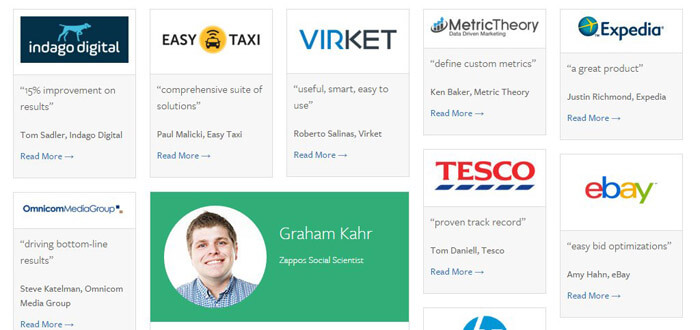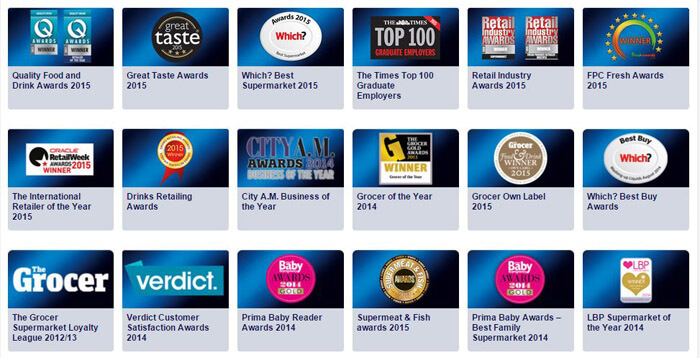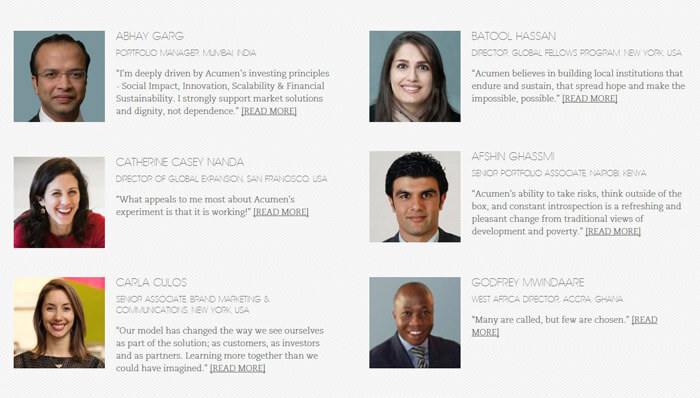We know how decisive the first impression is on a date or in a business meeting. We can similarly have an overwhelming effect on interested parties with an authentic and attention-grabbing website (and we commit a terrible blunder if we do not exploit the potential of our website, do not build long-term trust, and do not immediately capture the attention of interested parties).
BJ. Fogg, an expert in online reliability, distinguishes 4 types of authenticity:
1. Presumed authenticity. Everyone has heard of Zara's products, but no one would get their heads around Dara's innovations. When it comes to Zara, most people think of quality products, but when it comes to Dara, we have no idea what it is, so we immediately lose our trust in the brand. Well-known brands seem much more reliable than lesser-known ones.
2. Reliability based on reputation. We feel more authentic about products that our friends and family members think are "cool" and usable. If our best friend speaks superlatives about a pair of sports shoes, we will soon think about trying them out.
3. Surface reliability. Many times a website looks clear or chaotic at first glance. Let's strive to get into the second category, because this is a factor that strengthens not only our credibility, but also our online effectiveness.
4. Earned trust. Win the trust of online visitors with a well-functioning, eye-catching site, every part of which shows professionalism. Websites full of spelling mistakes, containing incorrect data, difficult to use or overcrowded are the visitors who flee at a maddening pace, whom we have lost forever. (Even more alarming are sites that attack with screaming music upon entry.)
According to research, the reliability of the website they visit is extremely important to four out of five users. When we walk into a store, we usually buy something from a reliable seller with authentic information. Online buyers are also looking for a friendly, reliable site and a product that is valuable to them - they will buy on a website with these qualities. On these pages, the information about the products is considered authentic, and they provide their personal data based on this trust. And while shopping, they feel that it is worth ordering online products, because they feel the shopping environment is reliable.
During our webshop UX audits, we prioritize the presence of trust-building elements, because they are proven to increase customer engagement and thus the number of sales.

Learn the 23 secrets of an authentic online presence, which will make your website reliable in the eyes of customers!
1. People love aesthetic web design.
According to Dr. Brent Coker's study, we really like beautiful things: we are psychologically "wired" to trust beautiful people, and the same is true of websites. 46% of the participants in an experiment examining more than 2,500 customers considered the role of design more important when examining websites than all other factors. An organized and beautiful website suggests professionalism and reliability - and this winning combination generates a lot of online purchases!
2. The address, telephone number and Frequently Asked Questions should be clearly visible.
It is worth focusing these on the upper part of the page if incoming calls are particularly important to us.
3. Easy contact is half the battle.
CONTACT should always be available from the navigation menu, it should be the last tab.
4. A relevant, personalized message can build even stronger trust.
Write content that is based on the behavior of interested parties (Google Analytics can be an excellent tool for this. )
5. Show the "mass" of our previous customers on the website.
This way, we can grab the attention of even more potential customers the moment they arrive on the website. They look at our website with greater confidence and see us as a more credible company when they see how many people have already bought a certain product before them. The strategy is even more striking if a spectacular statistical figure spins on the website, which stops at a specific figure (e.g. 85% of our customers are satisfied with their dental floss). It is also an effective solution if the page shows the number of Facebook fans and Twitter followers, which further strengthens trust in the brand.
6. Customer reviews and customer feedback should be included on the page.
Seeing these, others will also be curious about your product and services. Enthusiastic customer reviews dispel doubts about any product, positive experiences generate even more optimistic opinions. However, this will only be a successful strategy if the customer reviews are displayed together with a photo and name. Popular opinion makers (experts in a field, bloggers, actors) create even greater online interest and credibility.

7. People are always looking for an expert.
Because an expert in a field is light years more authentic than anyone else in the given subject. Introduce as many case studies as possible on your website, which show your expertise, and customers will trust you more.
8. Simple and understandable language.
People don't trust what they don't understand. Speak the language of your customers, so they will look at your website even more authentically.
9. Let's pay attention to the spelling!
Convoluted grammatical structures and glaring spelling errors make the site laughable and repel customers like onions repel vampires.
10. A constantly updated blog strengthens reliability.
A good blog keeps your visitors hooked: it offers valuable information day after day, which is why it's worth coming back to the site (as the number of returns increases, it becomes more likely that they will buy something on your website). Thanks to blog articles, you can once again appear as an expert, and nothing builds your credibility more than that. It's disappointing to land on a site where the last blog post was written two years ago (there are few better indicators of failure).
11. If you have awards, don't hide them!
Show them on the website, because they contribute a lot to building your credibility. Where, in what competition, competition, what position did you achieve?

12. Present your product in as much detail as possible.
During our webshop audits, we found that 50% of the sites do not do this, and this can be seen in the number of online sales and the trust of customers. A well-founded decision can only be made by a customer who has a sufficient amount of information about the given product. We put the visitors in an information-rich situation, so that the information available to them will tip the interested parties in the direction of the purchase. During one of Econsultary's researches, 60% of the participants made a purchase decision based on the detailed product description. The decision was influenced by three criteria: the amount of product information, the reliability of the product and the feeling that the product is specifically for them.
13. Let's show you the prices right away!
Many B2B companies don't do this and lose leads. When clicking on a website, we always want to know the prices, the lack of this can also cause mistrust.
14. Have a well-functioning Facebook page!
Which "entertains" interested parties with frequently updated content. Pushy sales techniques don't work on social media, people go to Facebook to relax. Here, we can become the center of attention with colorful, interesting posts that generate a lot of likes, shares and comments (these contents get the best reach on Facebook).
15. Your team's biography and photo should appear on the page.
In this way, not only will your website be authentic, people will build trust in the company as a whole.

16. Reduce the number of advertisements on the website to a minimum.
The constantly appearing advertisement ruins the user experience and communicates that the visitor is not the first.
17. A website that loads slowly suggests unreliability.
The interested party has doubts about the extra slow loading website, he runs away even before getting to know your product. He thinks that the site has been hacked, that it represents some kind of security risk, or that it is a frivolous site that you don't need to deal with. The average loading time is 5 seconds: if it's longer than you, you should improve it as soon as possible. According to KISSmetrics' post, every minute of loading time significantly improves customer confidence and creates a great foundation for those who stay on your website to tell others about your product because of the faster loading time.
Website speed can be measured with countless online tools, but a comprehensive audit process also highlights the elements that prevent fast loading.
18. Point to our page as many links as possible from authentic websites!
If well-known and popular professional sites in your area link to your website, it will also be a positive signal to Google's search robots, so your site will be more searchable and easier to find in Google's system as well.
19. What does Google tell you about you?
It is worth looking into what is found about your company in the search engine, what your former customers write about you on the forums. We also need to pay attention to the Google score of the website, because a high number indicates that it is easy to find, and a low value indicates that very few people find us.
20. Present your office with some great photos!
Customers will see that you have a real company with real people, so they will already trust you more. Forget about stock photos on the internet, often kitsch and false images will only destroy your credibility.

21. Make the money-back guarantee clearly visible.
Interested parties want to know the purchase process in detail. They are more enthusiastic about spending if they know what to do in case of dissatisfaction. With a clearly visible and understandable money-back guarantee, you can eliminate the last obstacle standing in the way of your purchase and put your reliability on an even more favorable basis!
22. Transparent e-mail principles.
You also need to be clear about what you are going to do with the email addresses you get from customers.
23. A successful offline appearance can also boost your online traffic!
In addition to online success, don't forget about the offline aspect. If an article about you or your business appears in a popular newspaper, it can make you even more credible (they may visit your website for this reason alone!).
Take advantage of the potential of an authentic and reliable website. Econsultary's customer behavior survey found out why online visitors trust a website they have never seen before. 48% of the participants paid attention to the loyalty cards on the site, which is why they decided to buy.
We wish you a growing reputation and a successful conversion!

